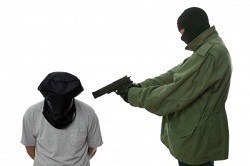
The days of free public Wi-Fi at Starbucks, hotels, airports, and restaurants may be numbered.
Why?
The new Copyright Alert System (“CAS”), a monster created by the entertainment industry in cooperation with large Internet Service Providers (ISPs), will serve as judge, jury, and executioner when it comes to suspected online piracy. This is Hollywood’s snarky response to Congress’ inability to pass new anti-piracy legislation because of public pressure.
Under CAS, suspected pirates will get 5 to 6 warnings from their ISP and apparently progressive punishment ranging from slowing down Internet access to cutting off access temporarily. Although the system doesn’t require ISPs to terminate accounts, what are the odds that ISPs will maintain accounts for those they deem repeat offenders?
Of course, you can pay for the “privilege” to challenge an accusation that you’ve committed copyright infringement.
“The Copyright Alert System includes an opportunity to challenge Alerts once you reach the Mitigation stage, after receiving three, four, or five Alerts depending on their ISP. If you believe you have received one or more Alerts in error you may request an Independent Review administered by the American Arbitration Association within fourteen (14) calendar days of receiving the Mitigation Alert. There is a $35 filing fee, which may be waived if you meet affordability criteria. The fee will be refunded if your challenge is successful.” Source: Center for Copyright Information
Even if CAS makes sense when there’s a single user on an account, it doesn’t when the account is for a business establishment offering free Wi-Fi.
Just about every public free Wi-Fi place has some idiot already slowing down bandwidth by pirating content.
Unless there’s an exception made in CAS for Starbucks and other places that have Wi-Fi available to clients and/or the public, most businesses will quickly be flagged as pirates under the system.
The CAS supposedly contains an exception for public Wi-Fi places like Starbucks. The target is residential clients.
If an exception is made for public Wi-Fi, what about online access provided by businesses to their employees? Is there any large company that doesn’t have a few employees pirating content at work?
Even the “exception” identified for companies that offer free Wi-Fi acknowledges that “very small businesses” can be subject to CAS copyright infringement alerts.
This raises the interesting point of fairness to small business. Why should the home-based business or the owner of one coffee shop be subject to CAS while exception is made for large companies like Starbucks?
Fair?
No. But do you really expect fairness from Hollywood’s anti-piracy vultures? What the entertainment industry couldn’t bribe enough politicians to pass, they’re getting by bullying ISPs (who were looking to cut bandwidth by heavy users anyway).
And if the system does work to deter piracy, how long do you think it will be until that exception for large companies like Starbucks disappears and CAS applies everywhere? CAS is the camel’s nose under the tent.
